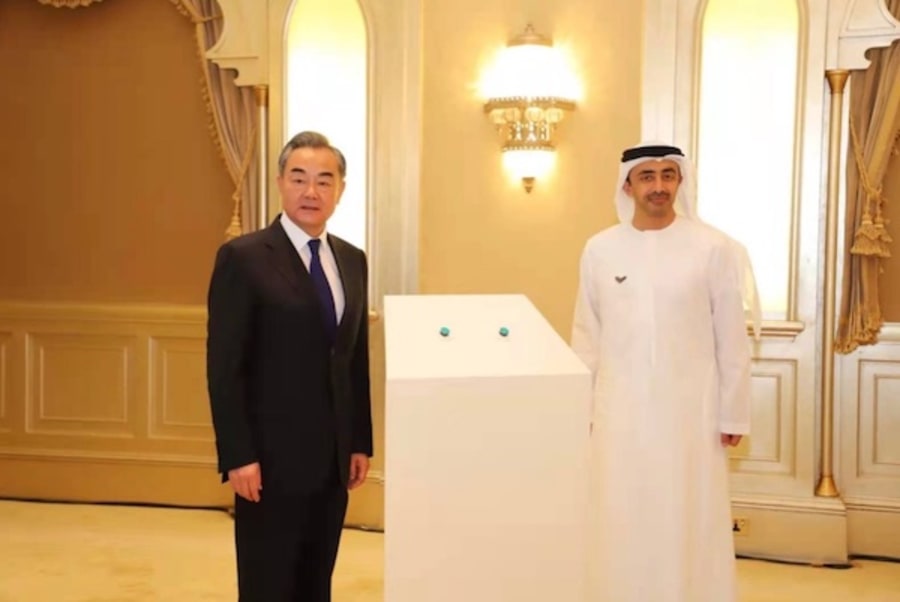In visit to Middle East, Chinese FM avoids Israel but plans to invite Israelis, Palestinians to China for talks
As United States gradually disengages from Middle East, China and Russia are increasingly filling the gap

Chinese Foreign Minister Wang Yi said last week that the government of China plans to invite Israelis and Palestinian to Beijing for bilateral talks.
“We will invite Palestinian and Israeli public figures to have talks in China,” Wang told al-Arabiya TV new channel.
It was not immediately clear whether the Chinese foreign minister was referring to official representatives of the Israeli and Palestinian governments. The complex history of Israeli-Palestinian talks has included both official and unofficial representatives from both sides over the years.
Wang’s statement coincides with his weeklong tour across the Middle East region in which he is scheduled to visit Saudi Arabia, Turkey, Iran, the United Arab Emirates, Bahrain and Oman, but not Israel.
As the United States is gradually disengaging from the Middle East, China and Russia are increasingly and more assertively seeking influence in the emerging power vacuum in the region. Unlike the Americans, who have strained relations with key Middle Eastern countries, such as Iran and Syria, the Chinese government has cultivated strong political ties with all regional players. While China maintains strong ties with Israel and Saudi Arabia, Beijing also has close ties with Iran.
American foreign policy has traditionally tried to balance its own interests with its values, such as democracy. By contrast, the Chinese government’s foreign policy worldwide is almost exclusively guided by Chinese state interests. More than 50% of China’s oil consumption comes from Middle Eastern oil imports. Alongside Saudi Arabia, Iran has emerged as one of China’s oil suppliers. Given the Chinese government’s dismal human rights record, it is hardly surprising that Beijing prefers dealing with authoritarian and despotic regimes in the Middle East and beyond.
At the same time, China has invested heavily in the Israeli tech sector and in Israeli infrastructure, such as Haifa’s new harbor and Tel Aviv’s new light-rail project. Bilateral Chinese-Israeli trade totaled some $13.1 billion in 2017 and China has emerged as Israel’s third largest trading partner after the European Union and the United States. There are even talks of an imminent Chinese-Israel free-trade pact.
While the Chinese economy is the second largest in the world today, the government’s assertive foreign policy is a function of its desire to eventually supplant America as the world’s leading economic and political power.
China’s involvement in the Middle East is connected to its massive Belt and Road Initiative (BRI), also known as the New Silk Road. Launched by Chinese President Xi Jinping in 2013, this global mega development and investment initiative seeks to dramatically enhance China’s global influence from East Asia to Europe by making countries worldwide increasingly dependent on China.
The effects of this Chinese policy are already evident, especially in Africa and parts of Eastern Europe, where cash-strapped governments are increasingly dependent on Chinese capital and goodwill.
Last week, Israel’s Ministry of Transport announced that “The Peace Railway” project between the Israeli city Haifa and Israel’s Gulf Arab partners is moving ahead. The project was initially proposed by former Israeli Minister of Transportation Israel Katz in 2017. It envisions a railway connecting the Israeli Mediterranean coast with the Arab states in the Persian Gulf via Jordan and Saudi Arabia.
It is likely that the Chinese are quietly involved in this multi-billion dollar, Israeli-Sunni Arab mega-infrastructure project.
But while Israel and the Sunni Arab world might welcome Chinese investments in the region, they could also be developing an unhealthy financial and infrastructural dependence on China.

The All Israel News Staff is a team of journalists in Israel.














